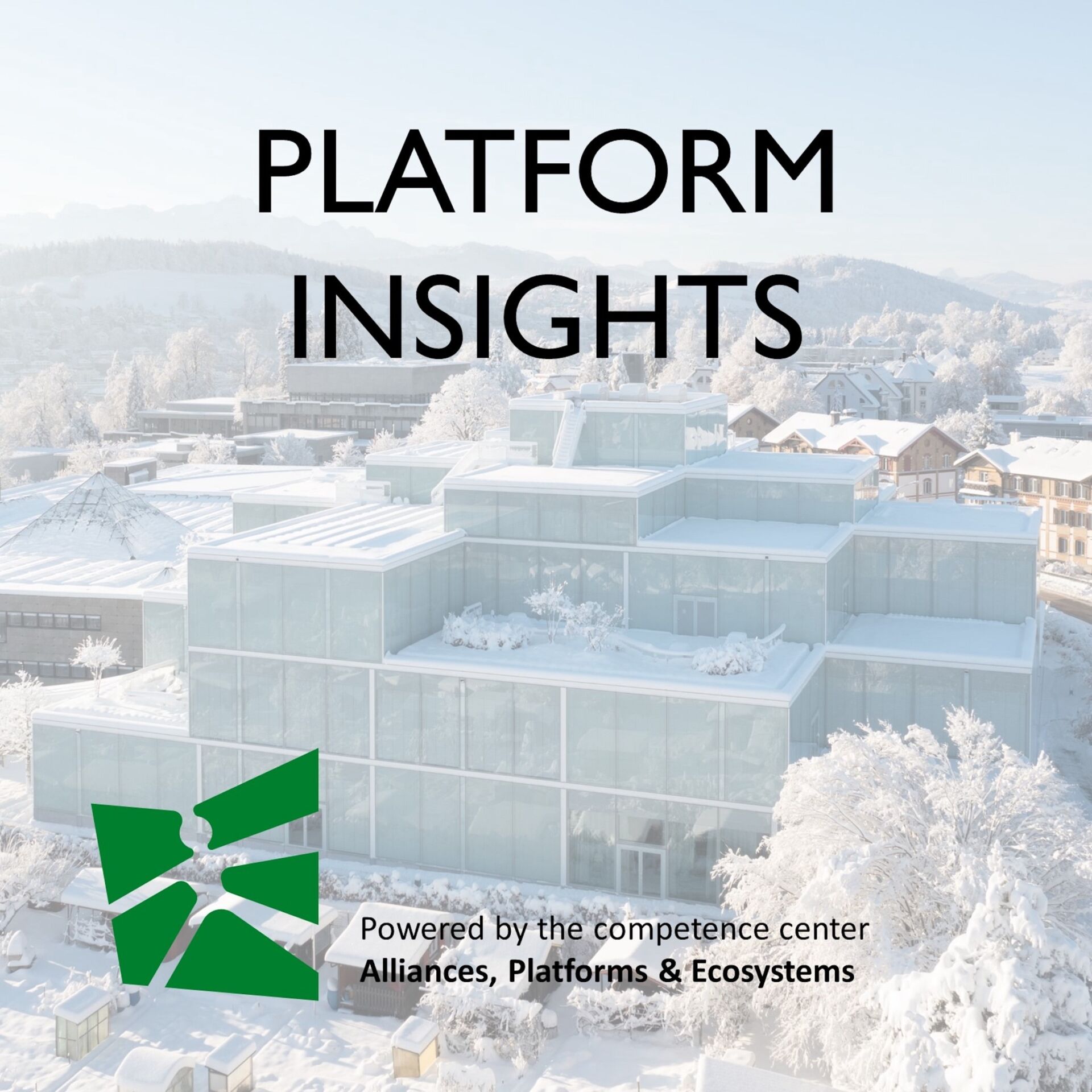Kompetenzzentrum Allianzen, Plattformen & Ökosysteme

Allianzen, Plattformen und Ökosysteme als Treiber der Realisierung von innovativen Nutzenversprechen
Das Kompetenzzentrum Alliances, Platforms & Ecosystems vernetzt interdisziplinäre Forschende der Universität St.Gallen mit Partner-Organisationen aus der Wirtschaft und dem öffentlichen Leben. Dieser holistische Ansatz ermöglicht uns, die Wünsche von KundInnen nach komplexeren, integrierteren Lösungen statt standardisierter Produkte und Dienstleistungen zu analysieren und Lösungsansätze zu entwickeln. Solche sogenannten Ökosysteme an vernetzten Akteuren, die gemeinsam kundenorienterte Lösungen entwickeln ohne notwendigerweise in hierarchischer Verbindung zueinander zu stehen, sollen bis zum Jahr 2030 $80 Trillionen des weltweiten Bruttoinlandsprodukts ausmachen (McKinsey, 2022).
Wir beschäftigen uns mit Fragen auf Ökosystem-Ebene:
- Wie entstehen, reifen und zerbrechen Ökosysteme?
- Welche Rollen nehmen die einzelnen Unternehmen in einem Ökosystem ein?
- Wann sollte man am besten in ein Ökosystem eintreten, wann es verlassen?
Ebenso studieren wir die strategischen Entscheidungen und Veränderungen von Unternehmen im Ökosystem-Kontext:
- Wie trifft man strategische Entscheidungen, die Ökosysteme betreffen?
- Wie organisiert man in Ökosystemen effektiv?
- Welche Veränderungen sind in etablierten Unternehmen nötig, die mit Ökosystemen konfrontiert sind?
Unser Angebot
Unser Kompetenzzentrum bietet ein breites Angebot rund um den Bereich Allianzen, Plattformen, und Ökosysteme an. Durch unsere Anbindung an die Universität St.Gallen verbinden wir auf einzigartige Weise erstklassige Forschung mit praktischen Anwendungsmöglichkeiten.
Für Unternehmen bieten wir firmeninterne Weiterbildungen wie Customized Programs, Workshops oder Seminare an. Für Einzelpersonen öffentliche Weiterbildungen. Möglich sind auch Unternehmenkollaborationen, welche speziell für Firmen gedacht sind, die mit uns mittel- bis langfristig zusammenarbeiten möchten.
Profitieren auch Sie von den langjährigen Erfahrungen unseres Kompetenzzentrums!
Firmeninterne Weiterbildungen
Das Zentrum bietet Seminare, customized programs und Workshops für Unternehmen, die durch (Plattform-) Ökosystem-basierte Wettbewerbsmodelle wachsen möchten. Neben klassischen Strategien und Mechanismen des Wachstums ermöglichen wir Wege zur Innovation produkt- oder dienstleistungsgetriebener Geschäftsmodelle zu einem integrierteren, kunden- und lösungsorientierteren Denken.
Dabei ist unser Vorgehen das folgende:
1. Analyse
In einem kostenlosen 2-stündigen Workshop definieren wir gemeinsam die Ausgangssituation, Ihre Ziele, die Zielgruppe, die gewünschten Themen und das weitere Vorgehen.
2. Konzeption
In enger Abstimmung mit Ihnen entwickeln wir ein Weiterbildungsprogramm – massgeschneidert auf Ihre Bedürfnisse.
3. Durchführung
Bevor die Weiterbildung beginnt, erhalten alle Teilnehmenden Zugang zur Lernplattform. Erwartungen werden abgeholt und Vorbereitungsaufgaben gestellt. Die Programmdurchführung ist interaktiv und praxisorientiert, die Inhalte zu jeder Zeit forschungsbasiert und praxiserprobt.
4. Transfer & Evaluation
Nach der Weiterbildung stellen wir mit Multiple Choice-Tests, Lessons Learned oder Transferarbeiten sicher, dass die Teilnehmenden das neu erlernte Wissen und die neuen Methoden erfolgreich in ihrem Tagesgeschäft anwenden.
Unternehmenskollaborationen
Aktuell überleben nur circa 15-25% aller initiierten digitalen Plattformen und Ökosysteme. Bei Allianzen liegt die Erfolgsquote bei circa 30-40%. Gerne unterstützen wir Sie mittel- bis langfristig im Rahmen von Unternehmenskollaborationen. Das Kompetenzzentrum zielt darauf ab, einen wirkungsvollen Austausch zwischen Wissenschaft und Unternehmenswelt zu initiieren, der sich auf das strategische Management im Kontext von Allianzen, Plattformen und Ökosystemen konzentriert. Dabei unterstützen wir durch die Aufbereitung von Best-Practices und arbeiten gemeinsam mit unseren Partnern, um Fehler im Strategischen Management von Allianzen, Plattformen und Ökosystemen zu vermeiden. Gemeinsam verbinden wir die neuesten Erkenntnisse aus Wissenschaft und Praxis, um Ihr Praxisvorhaben gelingen zu lassen.
Unsere Partner

Testimonials

«The exchange between academia and practical application is essential for progress and market impact. We greatly value our ties with the competence center alliances, digital platforms and ecosystems.»
Dominik Temerowski, VP Alliance Management, Swisscom
«We are happy to leverage the unique expertise and experience of the University of St.Gallen to further refine our ecosystem in a series of workshops. The competence center on Alliances, Platforms and Ecosystems of the Institute of Management and Strategy is of great value to us when applying cutting-edge theoretical insights into practice.»
Christine Platiel, COO, LiveWell by Zurich Insurance Group


Podcast: Platform Insights
Hören Sie rein, wenn wir über die neusten Erkenntnisse aus unserer Forschung zu Allianzen, Plattformen & Ökosysteme sprechen.
Unser Team
Executive Director















